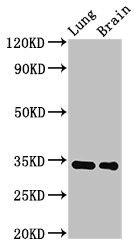Mgll Antibody
-
货号:CSB-PA013787LA01RA
-
规格:¥440
-
促销:
-
图片:
-
其他:
产品详情
-
产品名称:Rabbit anti-Rattus norvegicus (Rat) Mgll Polyclonal antibody
-
Uniprot No.:Q8R431
-
基因名:Mgll
-
别名:Mgll antibody; Mgl2 antibody; Monoglyceride lipase antibody; MGL antibody; EC 3.1.1.23 antibody; Monoacylglycerol lipase antibody; MAGL antibody
-
宿主:Rabbit
-
反应种属:Rat, Mouse
-
免疫原:Recombinant Rat Monoglyceride lipase protein (1-303AA)
-
免疫原种属:Rattus norvegicus (Rat)
-
标记方式:Non-conjugated
本页面中的产品,Mgll Antibody (CSB-PA013787LA01RA),的标记方式是Non-conjugated。对于Mgll Antibody,我们还提供其他标记。见下表:
-
克隆类型:Polyclonal
-
抗体亚型:IgG
-
纯化方式:>95%, Protein G purified
-
浓度:It differs from different batches. Please contact us to confirm it.
-
保存缓冲液:Preservative: 0.03% Proclin 300
Constituents: 50% Glycerol, 0.01M PBS, pH 7.4 -
产品提供形式:Liquid
-
应用范围:ELISA, WB
-
推荐稀释比:
Application Recommended Dilution WB 1:500-1:5000 -
Protocols:
-
储存条件:Upon receipt, store at -20°C or -80°C. Avoid repeated freeze.
-
货期:Basically, we can dispatch the products out in 1-3 working days after receiving your orders. Delivery time maybe differs from different purchasing way or location, please kindly consult your local distributors for specific delivery time.
相关产品
靶点详情
-
功能:Converts monoacylglycerides to free fatty acids and glycerol. Hydrolyzes the endocannabinoid 2-arachidonoylglycerol, and thereby contributes to the regulation of endocannabinoid signaling, nociperception and perception of pain. Regulates the levels of fatty acids that serve as signaling molecules and promote cancer cell migration, invasion and tumor growth.
-
基因功能参考文献:
- 4 weeks of post-weaning social isolation increased aggressive grooming of a novel same-sex conspecific in male and female rats. Treatment with the MAGL inhibitor MJN110 eliminated this increase in aggressive grooming in both males and females, without reducing non-aggressive social behavior. Activation of the medial prefrontal cortex was increased by social interaction but was blunted by MJN110 only in females. PMID: 29292159
- MGL has an important role in insulin secretion PMID: 26867016
- expression of MAGL is distributed in certain cell types and time-dependently expressed in skeletal muscles after trauma, suggesting that MAGL may be involved in inflammatory response, fibrogenesis and regeneration during skeletal muscle wound healing PMID: 25921063
- MAGL inhibitor JZL184 is able to inhibit the inflammatory response and interfere with contused muscle healing. PMID: 25912803
- results suggest that MAGL regulates phagocytosis, but not LPS-mediated cytokine induction in microglia PMID: 26166819
- the current findings support the therapeutic potential of FAAH and monoacylglycerol lipase inhibitors as a novel pharmacotherapy for pain PMID: 25041240
- Data indicate that nerve growth factor (NGF) controls monoacylglycerol lipase (MGL) degradation in vitro and in vivo. PMID: 23319656
- Pretreatment with MAGL inhibitor URB602 significantly reduces neonatal hypoxic-ischemic brain damage and improves functional outcome. PMID: 22821058
- Maternal deprivation induced a significant decrease in MAGL immunoreactivity in the rat hippocampal CA3 and CA1 areas, more marked in males than in females. PMID: 20599824
- hydrolysis by means of monoglyceride lipase is a primary mechanism for 2-arachidonoylglycerol inactivation in intact neurons PMID: 12136125
- MGL is localized in the enteric nervous system where endocannabinoids regulate intestinal motility. MGL is highly expressed in the epithelium, where this enzyme may have digestive or other functions yet to be determined. PMID: 18948437
显示更多
收起更多
-
亚细胞定位:Cytoplasm, cytosol. Membrane; Peripheral membrane protein.
-
蛋白家族:AB hydrolase superfamily, Monoacylglycerol lipase family
-
组织特异性:Ubiquitous. Highly expressed in adipose tissue, adrenal gland, ovary, heart, spleen, lung, skeletal muscle, kidney and testis. Highly expressed throughout the brain.
-
数据库链接:
KEGG: rno:29254
STRING: 10116.ENSRNOP00000030271
UniGene: Rn.40396
Most popular with customers
-
-
Phospho-YAP1 (S127) Recombinant Monoclonal Antibody
Applications: ELISA, WB, IHC
Species Reactivity: Human
-
-
-
-
-
-






















